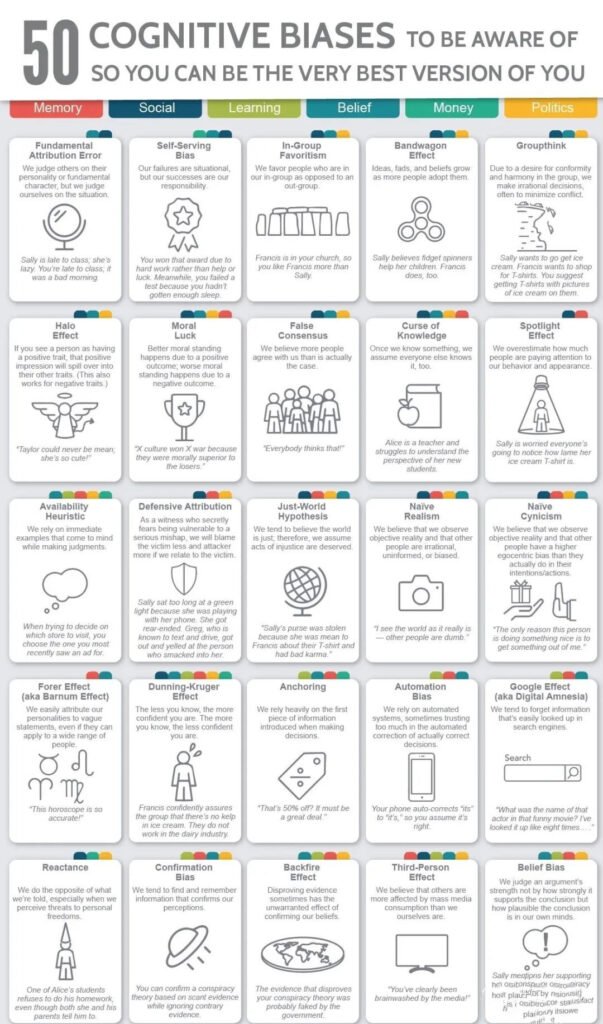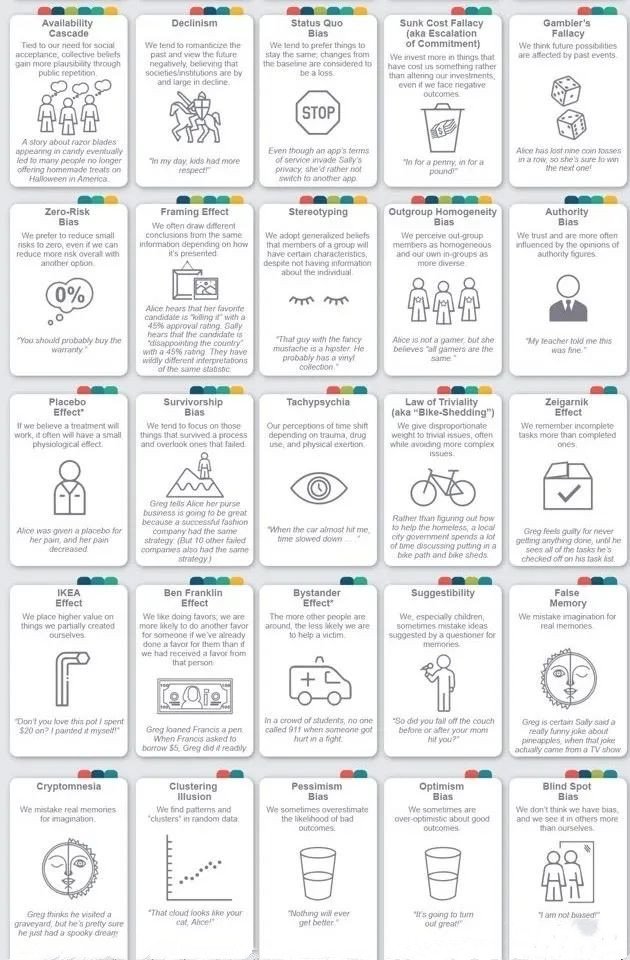lon Musk昨晚发推,认为从小就该被教导常见的认知偏见。小编特翻译以飨读者。
人类的大脑非常棘手:虽然我们认为我们知道一些事情,但有一整套认知偏见可能会破坏工作。几乎每天都会出现的 50 种认知偏差,呈现在 Facebook 的小争论里、星座运势分析里和全球舞台上。认知偏差会因为微妙的集体思维定势破坏您的管理会议,也会帮助您在销售时花太多来“锚定”客户。了解这些偏见可以帮助您在偏离目标时有所认识,并做出更明智的决定。
Fundamental Attribution Error: We judge others on their personality or fundamental character, but we judge ourselves on the situation.
基本归因错误:我们基于个性或基本特征判断他人,但我们判断自己时基于现状。
Self-Serving Bias: Our failures are situational, but our successes are our responsibility.
自助偏见:我们的失败是态势,但我们的成功是我们担起了责任。
In-Group Favoritism: We favor people who are in our in-group as opposed to an out-group. 组内偏爱:我们偏爱处于我们组内而不是组外的人。
Bandwagon Effect: Ideas, fads, and beliefs grow as more people adopt them.
潮流效应:想法、时尚和信仰随着越来越多的人采用它们而增长。
Groupthink: Due to a desire for conformity and harmony in the group, we make irrational decisions, often to minimize conflict. 群体思维:由于渴望团队中的一致性与和谐,我们做出不合理的决定,通常是为了尽量减少冲突。
Halo Effect: If you see a person as having a positive trait, that positive impression will spill over into their other traits. (This also works for negative traits.)
光环效应:如果你认为一个人具有积极的特质,那么这种积极的印象会溢出到他们的其他特质中。 (这也适用于负面特征。)
Moral Luck: Better moral standing happens due to a positive outcome; worse moral standing happens due to a negative outcome.
道德运气:由于积极的结果,会出现更好的道德地位; 更糟糕的道德地位是由于消极的结果而发生的。
False Consensus: We believe more people agree with us than is actually the case.
错误共识:我们认为同意我们的人比实际情况多。
Curse of Knowledge: Once we know something, we assume everyone else knows it, too.
知识诅咒:一旦我们知道某事,我们就假设其他人也知道它。
Spotlight Effect: We overestimate how much people are paying attention to our behavior and appearance.
聚光灯效应:我们高估了人们对我们的行为和外表的关注程度。
Availability Heuristic: We rely on immediate examples that come to mind while making judgments.
可用性启发式:我们在做出判断时依靠立即浮现的直接例子。
Defensive Attribution: As a witness who secretly fears being vulnerable to a serious mishap, we will blame the victim less if we relate to the victim.
防御性归因:作为一个暗中害怕自己容易受到严重事故影响的证人,如果我们与受害者联系起来,我们就会减少对受害者的指责。
Just-World Hypothesis: We tend to believe the world is just; therefore, we assume acts of injustice are deserved.
公正世界假说:我们倾向于相信世界是公正的; 因此,我们认为不公正的行为是应得的。
Naïve Realism: We believe that we observe objective reality and that other people are irrational, uninformed, or biased.
朴素现实主义:我们相信我们观察的是客观现实,而其他人是不理性的、不知情的或有偏见的。
Naïve Cynicism: We believe that we observe objective reality and that other people have a higher egocentric bias than they actually do in their intentions/actions.
天真的犬儒主义:我们相信我们观察的是客观现实,并且其他人在他们的意图/行动中比他们实际具有更高的以自我为中心的偏见。
https://wxa.wxs.qq.com/tmpl/lz/base_tmpl.html
Forer Effect (aka Barnum Effect): We easily attribute our personalities to vague statements, even if they can apply to a wide range of people.
Forer 效应(又名巴纳姆效应):我们很容易将我们的个性归因于模糊的陈述,即使它们可以适用于广泛的人。
Dunning-Kruger Effect: The less you know, the more confident you are. The more you know, the less confident you are.
邓宁-克鲁格效应:你知道的越少,你就越自信。 你知道的越多,你就越不自信。
Anchoring: We rely heavily on the first piece of information introduced when making decisions.
锚定:我们在做决定时非常依赖引入的第一条信息。
Automation Bias: We rely on automated systems, sometimes trusting too much in the automated correction of actually correct decisions.
自动化偏差:我们依赖自动化系统,有时过于相信实际正确决策的自动修正。
Google Effect (aka Digital Amnesia): We tend to forget information that’s easily looked up in search engines.
谷歌效应(又名数字健忘症):我们往往会忘记在搜索引擎中很容易找到的信息。
Reactance: We do the opposite of what we’re told, especially when we perceive threats to personal freedoms.
反应:我们的行为与我们被告知的相反,尤其是当我们认为个人自由受到威胁时。
Confirmation Bias: We tend to find and remember information that confirms our perceptions.
确认偏差:我们倾向于找到并记住能证实我们看法的信息。
Backfire Effect: Disproving evidence sometimes has the unwarranted effect of confirming our beliefs.
适得其反的效果:反驳证据有时会产生无根据的证实我们的信念的效果。
Third-Person Effect: We believe that others are more affected by mass media consumption than we ourselves are.
第三人称效应:我们相信大众媒体消费对他人的影响比我们自己更大。
Belief Bias: We judge an argument’s strength not by how strongly it supports the conclusion but how plausible the conclusion is in our own minds.
信念偏差:我们判断一个论点的力量,不是根据它支持结论的强度,而是根据我们自己心中的结论的可信度。
Availability Cascade: Tied to our need for social acceptance, collective beliefs gain more plausibility through public repetition.
可用性级联:与我们对社会接受的需要相关联,集体信念通过公开重复获得更多的可信度。
Declinism: We tent to romanticize the past and view the future negatively, believing that societies/institutions are by and large in decline.
消极主义:我们倾向于将过去浪漫化并消极地看待未来,认为社会/机构大体上正在衰退。
Status Quo Bias: We tend to prefer things to stay the same; changes from the baseline are considered to be a loss.
现状偏见:我们倾向于保持不变; 相对于基线的变化被认为是一种损失。
Sunk Cost Fallacy (aka Escalation of Commitment): We invest more in things that have cost us something rather than altering our investments, even if we face negative outcomes.
沉没成本谬误(又名承诺升级):即使我们面临负面结果,我们也会更多地投资于使我们付出代价的事情,而不是改变我们的投资。
Gambler’s Fallacy: We think future possibilities are affected by past events.
赌徒谬误:我们认为未来的可能性会受到过去事件的影响。
Zero-Risk Bias: We prefer to reduce small risks to zero, even if we can reduce more risk overall with another option.
零风险偏差:我们更愿意将小风险降低到零,即使我们可以通过另一种选择来降低整体风险。
https://wxa.wxs.qq.com/tmpl/lz/base_tmpl.html
Framing Effect: We often draw different conclusions from the same information depending on how it’s presented.
框架效应:我们经常从相同的信息中得出不同的结论,取决于它的呈现方式。
Stereotyping: We adopt generalized beliefs that members of a group will have certain characteristics, despite not having information about the individual.
刻板印象:我们普遍认为,尽管没有关于个人的信息,但一个群体的成员将具有某些特征。
Outgroup Homogeneity Bias: We perceive out-group members as homogeneous and our own in-groups as more diverse.
外群体同质性偏见:我们认为外群体成员是同质的,而我们自己的内群体则更加多样化。
Authority Bias: We trust and are more often influenced by the opinions of authority figures.
权威偏见:我们信任权威人物的意见,并经常受其影响。
Placebo Effect: If we believe a treatment will work, it often will have a small physiological effect.
安慰剂效应:如果我们相信某种治疗会奏效,它通常会产生很小的生理效应。
Survivorship Bias: We tend to focus on those things that survived a process and overlook ones that failed.
幸存者偏差:我们倾向于关注那些在过程中幸存下来的事情,而忽略那些失败的事情。
Tachypsychia: Our perceptions of time shift depending on trauma, drug use, and physical exertion.
Tachypsychia:
我们对时间的看法取决于创伤、吸毒和体力消耗。
Law of Triviality (aka “Bike-Shedding”): We give disproportionate weight to trivial issues, often while avoiding more complex issues.
琐碎法则(又名“Bike-Shedding”):我们通常对琐碎的问题给予不成比例的重视,同时避免更复杂的问题。
Zeigarnik Effect: We remember incomplete tasks more than completed ones.
Zeigarnik 效应:我们记得未完成的任务比完成的任务更容易。
IKEA Effect: We place higher value on things we partially created ourselves.
宜家效应:我们更看重自己部分创造的东西。
Ben Franklin Effect: We like doing favors; we are more likely to do another favor for someone if we’ve already done a favor for them than if we had received a favor from that person.
本·富兰克林效应:我们喜欢帮人; 如果我们已经为某人做了一件好事,那么我们更有可能为他们做另一件好事,而不是从那个人那里得到恩惠。
Bystander Effect: The more other people are around, the less likely we are to help a victim.
旁观者效应:周围的人越多,我们帮助受害者的可能性就越小。
Suggestibility: We, especially children, sometimes mistake ideas suggested by a questioner for memories.
暗示性:我们,尤其是儿童,有时会将提问者提出的想法误认为是记忆。
False Memory: We mistake imagination for real memories.
虚假记忆:我们将想象误认为真实的记忆。
Cryptomnesia: We mistake real memories for imagination.
Cryptomnesia:我们将真实的记忆误认为是想象。
Clustering Illusion: We find patterns and “clusters” in random data.
聚类错觉:我们在随机数据中发现模式和“聚类”。
Pessimism Bias: We sometimes overestimate the likelihood of bad outcomes.
悲观偏见:我们有时会高估坏结果的可能性。
Optimism Bias: We sometimes are over-optimistic about good outcomes.
乐观偏见:我们有时对好的结果过于乐观。
Blind Spot Bias: We don’t think we have bias, and we see it others more than ourselves.
盲点偏见:我们不认为自己有偏见,我们看到别人比我们自己更多。




